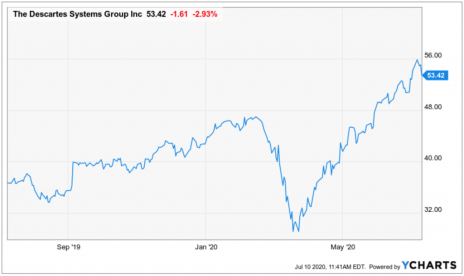As investors, we’re taught that portfolio diversification is a good thing. I don’t necessarily agree - and neither does Warren Buffett.
I have a love-hate relationship with small-cap stocks.
I love the asset class and the huge upside potential of individual small-cap stocks. I also feel strongly that investors need to have exposure if they are investing for the long-term.
However, the conventional wisdom that small caps outperform is patently false when you look at recent history. The asset class has underperformed large caps over the last one-, three-, and 10-year periods.
There are a lot of reasons why this is the case, including structural issues with the small-cap index.
[text_ad]
But what I want to talk about today is the myth that portfolio diversification by itself is inherently good. I want to show how that myth can push investors into buying underperforming small-cap index funds.
Most importantly, I want to offer a better solution so you can generate higher returns.
Small-Cap Index Suffers from too Much Diversification
The short version of the portfolio diversification myth is, as Warren Buffett once said, “Diversification is protection against ignorance.”
If you have no idea what individual stocks you should buy (i.e. if you are ignorant, to use Buffett’s term) then yes, you can gain broad exposure to an asset class by buying an index fund (protection).
But you’re going to get a lot of junk mixed in with the gems.
If you can screen out most of the junk and allocate more money to the gems – i.e. replace ignorance with knowledge – then you will absolutely destroy that overly diversified index over time.
In short, again to quote Buffett, portfolio diversification “… makes little sense if you know what you are doing.”
This cuts against the conventional wisdom that diversification is good!
But that wisdom is only partially accurate. In reality, the benefits of diversification are substantially reached when an investor owns around 20 to 30 stocks.
That’s not to say investors shouldn’t own more than 30 stocks. But if they do, they should do so knowing that the incremental portfolio diversification benefit of each additional stock goes down after that 20 to 30 stock threshold is crossed.
That’s especially true if they are blindly buying dozens if not hundreds of low-quality stocks, which is what arguably happens when you buy a small-cap index.
I could go into details of why there are so many junk companies in the small-cap index. But that’s a different subject.
The gist of my message today is that investors who wish for exposure to small caps are far better off constructing their own portfolio of 10 to 20 high-quality small-cap stocks and holding those – with appropriate replacements as needed – over the long-term.
Naturally, this requires more work and some guidance. That’s where an advisory like Cabot Small-Cap Confidential or Cabot Early Opportunities comes in.
What types of small-cap stocks should you look for?
I prefer growth names that offer pure-play exposure to secular growth trends, have a solid business model, a history of successful product launches and/or acquisitions that increases their addressable market, and a rapid growth rate, with a rational path to profitability, if they are not yet there.
These are the types of stocks that are likely to go through the inevitable corrections that will come and go when you’re invested for the long-term, and still come out the other end providing market-crushing returns.
Descartes Systems (DSGX) – A Steady Grower
One example is Descartes Systems (DSGX), a $4.6 billion market cap company that specializes in logistics management software solutions. The company operates the largest multi-modal logistics network in the world. Its range of product offerings and integrations has led to loyal, long-term customers.
Big picture, this company is all about software that helps things get where they need to go. This is something customers need in all times given increasingly complex global trade networks that are often disrupted, which slows down delivery time.
Descartes helps customers overcome these challenges. The secret sauce is a proprietary logistics data and an analytics platform that automates and optimizes inefficient delivery processes.
Products span connectivity and document exchange, route planning, inventory and asset visibility, wireless dispatch, rate management and warehouse optimization.
Despite a challenging macro economy heading into the COVID-19 pandemic, Descartes has been a steady grower.
Revenue was up 16% in fiscal 2019 and up 18%, to $326 million, in fiscal 2020 (ended January 31), while adjusted EPS rose 14% and 13%, respectively.
Looking forward, revenue growth in fiscal 2021 will likely be reduced into the single digits due to the pandemic, then get back into the teens in fiscal 2022. EPS growth should increase into the 20% to 30% range each year.
Descartes isn’t the sexiest small cap out there, nor is it the fastest grower you can find. For these reasons there’s not a ton of media coverage.
However, our goal here isn’t to brag to our friends that we have the hottest stock in the world but to construct a small-cap portfolio that can demolish the market over the long-term. That means owning high-quality companies and managing risk.
Descartes, just like most small-cap software stocks, will go through 20% to 35% corrections from time to time. These aren’t times to bail, but to add to positions that you already own. Again, think long-term.
I added Descartes Systems to our Cabot Early Opportunities portfolio back on April 15 and we’re up around 40% since. In comparison, the S&P 500 is up 13% (i.e. Descartes is up 27% more).
To learn what other early-stage growth stocks I’m currently recommending in my Cabot Early Opportunities advisory, click here.
[author_ad]


